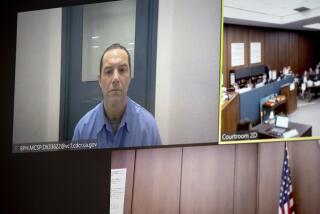Man Pleads Guilty After DNA Testing : Law: In a precedent-setting case, a judge allows DNA test results in court. That decision caused a man accused of rape to change his plea.
- Share via
SANTA ANA — An Irvine man pleaded guilty Monday to the rape of a doughnut shop clerk, just three days after the judge in his case set an Orange County precedent by letting prosecutors use DNA fingerprint laboratory evidence against him.
Garry Foster Walker, 40, was sentenced to nine years in prison by Superior Court Judge Myron S. Brown on three counts of rape involving force by use of a knife.
Walker changed his plea after a lengthy hearing on Friday during which Superior Court Judge Jean H. Rheinheimer ruled that results of DNA fingerprinting met the court’s evidentiary standards in Walker’s case.
DNA, deoxyribonucleic acid, is an essential building block in living matter and contains the biochemical makeup of an individual’s genes. DNA fingerprinting is a relatively new blood test technique that prosecutors say can pinpoint to a 99%-plus accuracy whether semen left in a rape victim can be matched to a defendant.
DNA specialists say that if a match is made between a defendant’s blood sample and the semen sample, their tests are so accurate that they can safely say that only one person in a billion could be the victim’s assailant. Before DNA fingerprinting, lab tests could only show whether the defendant and the rapist had the same blood type.
While several states have permitted DNA test results in court, only in recent cases in Ventura and Los Angeles counties had it been permitted in California before Rheinheimer’s ruling.
Orange County Deputy Dist. Atty. Dennis D. Bauer, a DNA specialist, said Walker’s guilty plea was “a good sign that DNA is very persuasive evidence.”
More significant to prosecutors is the impact that Rheinheimer’s decision in the Walker case could have on the pending trial of Danny Harris, 39, who faces more than 50 rape counts involving more than 20 victims. That case is now in a DNA admissibility hearing before Superior Court Judge William R. Froeberg.
Harris’ lawyer, John D. Barnett, said Monday that he did not see the Walker case having an impact on the Harris case. The DNA tests in Harris’ case were conducted at a private laboratory, while the tests in the Walker case came from the FBI. But Bauer considered Rheinheimer’s ruling significant in the Harris case.
“It is at least a local precedent, and Judge Rheinheimer commands a great deal of respect in this county,” Bauer said.
He added that although the tests came from different laboratories, the techniques are similar. Also, he said, the expert testimony in the Walker hearing can now be read into the record at the Harris hearing.
Attorneys for Walker and Harris argue that there is still too much room for error in DNA testing techniques.
While Walker’s is the first case in which DNA testing was admitted in the county, DNA fingerprinting was a factor in two earlier cases. In one of them, a defendant pleaded guilty after being told that DNA tests would be conducted. In the second case, a defendant was acquitted when DNA test results arrived too late for the jury’s consideration.
Walker was accused of raping a clerk at a DK’s Donuts in Costa Mesa in the pre-dawn hours of Jan. 25, 1989. Brown sentenced him to six years on rape and robbery charges and added three years for use of a knife.
More to Read
Sign up for Essential California
The most important California stories and recommendations in your inbox every morning.
You may occasionally receive promotional content from the Los Angeles Times.













